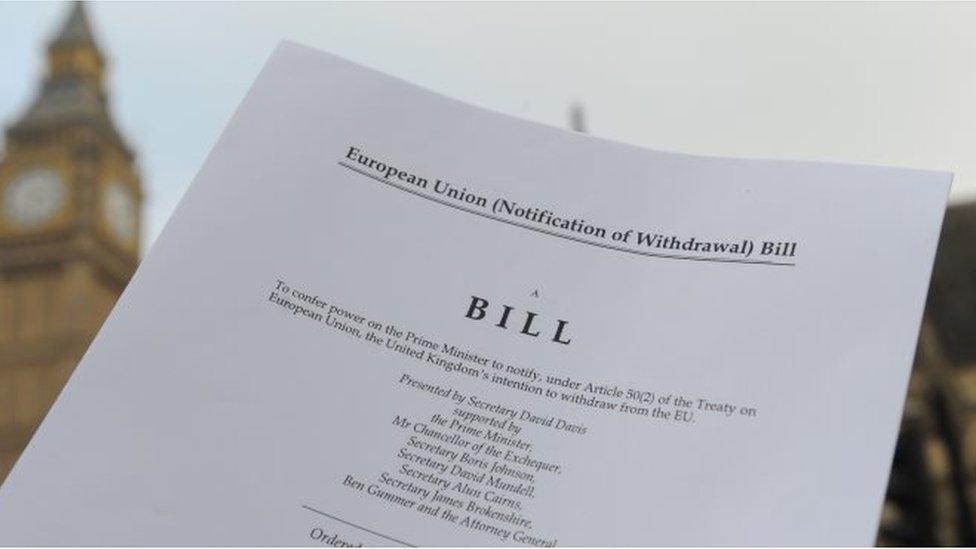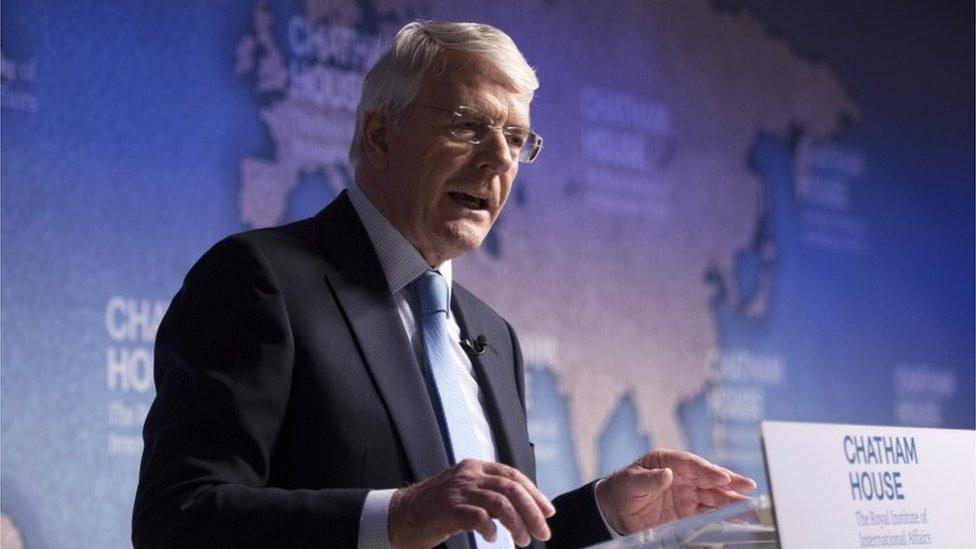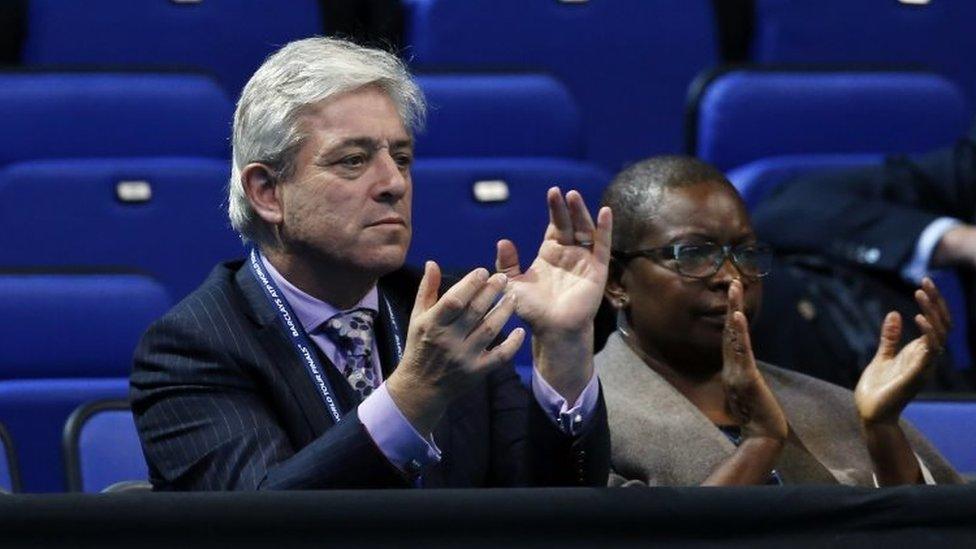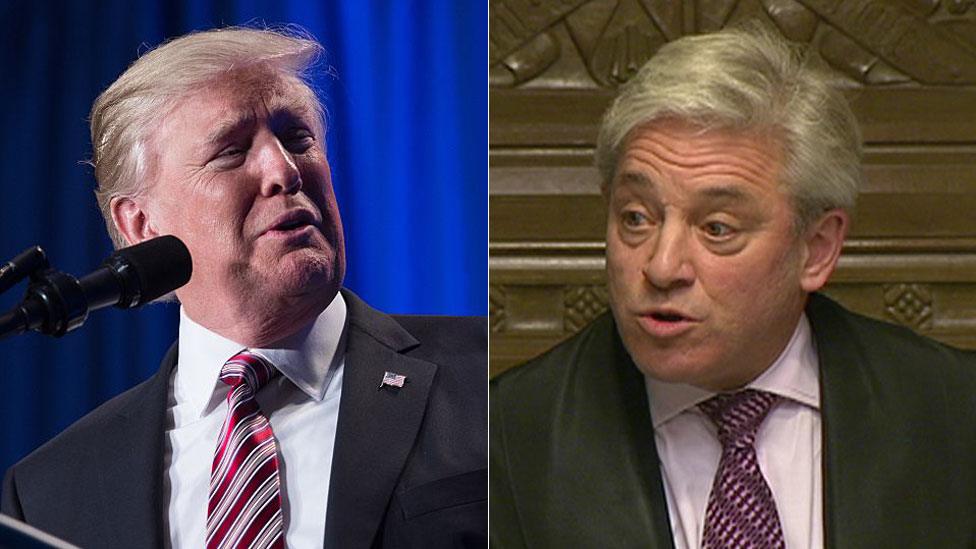Brexit: When will we see a real parliamentary clash?
- Published
- comments

Apocalypse when? So far every parliamentary event touted as a major Brexit confrontation has fizzled out.
Would remainers block the Article 50 Bill in the Commons? No.
What about a killer amendment? Not even close.
In the Lords then? Peers didn't even divide over the second reading, and Peter Hain's Single Market amendment was swatted aside quite comfortably, at committee stage this week.
There remains a possibility that peers might amend the bill on the issues of the status of EU citizens resident in Britain, or on the requirement for a "Meaningful Vote". But would even that call down parliamentary Armageddon? There might be a bit of kerfuffle, if their lordships dared offer an amendment to the Brexit Bill, but the chances are that swift rejection of any amendment by MPs would kibosh any further resistance in the Upper House.
One ping from the Lords, one pong from MPs; end of story.
Pressure points
So if there is ever to be a genuine parliamentary threat to the government's Brexit plans, when might it come?
The main pressure points are a bit further down the road….. and the trouble might come from either side of the Conservatives' Brexit divide, depending on what the government is doing.
The first pressure point will come in the autumn when negotiations start in earnest, after the French and German elections are done. At that point the EU will present its opening bid, which will probably be a demand for the UK to stump up a considerable exit fee. Will that provoke demands that the UK should throw up its hands and walk away from the EU then and there? The battle lines on this are already beginning to form, with talk of legal advice on the enforceablity or otherwise of any EU demands.
Or fast forward to the autumn of 2018 - the point at which the UK's exit package will have to start going before the European Parliament, and maybe EU national and even regional parliaments.
Here the key issue will be the kind of price that might be required for favourable UK access to the EU single market; if the government is not prepared to pay it, the threat to its majority would probably come from the Remain side of the Conservative Party; if the government is prepared to accept terms that look too much like EU membership lite, the threat would be from the hard Brexiteer wing.
And some of the real veteran Brexiteers would be against any deal that amounted to paying a fee for market access, especially if the fee was open to upward revision every few years. Careful distinctions are already being rehearsed between settling outstanding Euro-debts (expect some really hard bargaining), paying to participate in specific programmes, like the Erasmus student exchange programme (considered on a case-by-case basis), and the idea of a continuing access fee - which is a real red line.
This is where the parliamentary pressure for MPs to be given a "meaningful vote" on the Brexit deal, before it is signed and sealed, comes into play; it creates the moment for a set piece confrontation in the Commons around these issues.
Actually, the amendments offered to the Article 50 Bill are not essential in order for this confrontation to take place - one way or another, if there is enough pressure for a vote, someone will find a way to ensure that it happens, especially with the current Speaker in the Chair. So if the government were to break the promise of a final vote, offered by Brexit Minister David Jones, a vote would almost certainly be forced via an Opposition Day or a backbench debate.
Dissection of former PM's speech
But aside from the issues thrown up by the Brexit process, what's fascinating is the body language of the two factions.
Take the Brexiteers' reaction to the John Major Brexit speech.

A little more charm, and a lot less cheap rhetoric, would do much to protect the UK's interests, Sir John said in his speech
Here was an example of the new Conservative establishment still behaving like an insurgency. The Brexit Central website, the authentic voice of the Leave cause, featured what it described as "a brutal dissection" of the speech from Tory MP Jacob Rees-Mogg, which included such adjectives as "condescending, confused, naive, bordering on deliberately destructive, snide, bitter, deeply negative and defeatist."
This is not the confident voice of a triumphant new dispensation. This seems like part score-settling (some of the veteran Maastrichtistas have been waiting decades to cut loose and revenge themselves on their former leader) and part insecurity, as if they cannot quite accept that they've won, and expect some Europhile deus ex machina to dash the cup of Brexit from their lips.
And neither is it smart tactics. This is not how you reach out to the 48% and bring them over to your side.
The truth is that after 20 or 30 years as a guerrilla army, many Brexiteers can't break the bare-knuckle habits learned under siege by generations of whips.
And the reverse is true of the old establishment - the loose confederation of pro-EU ex-ministers now roaming the government backbenches. They are miles from mastering the insurgent arts.
Most have never previously had the knock on the door in the night from the whips, and some have found the experience traumatic and heavy-handed. They are also discouraged by the numbers game in the Commons. To defeat the government (plus Douglas Carswell, plus the eight DUP MPs, plus, perhaps, eight hard-line Labour Brexiteers) they would need about 30 Conservatives to defy the whip AND they would need Labour to show up, too.
With the Conservatives, one MP up, post Copeland, and Labour one MP down after the passing of Gerald Kaufman, the Commons mathematics has tilted a little in the government's favour, and any potential euro-rebellion is made more difficult by a lack of organisation and cohesion among pro-EU Tories.
Rebellions are fuelled by credibility - why take a risk with your career, if the effort is doomed to defeat from the start? They lack the discipline formed in adversity on the Brexiteer side, and may be years acquiring it, if their cause can stay alive that long.
- Published7 February 2017

- Published6 February 2017
